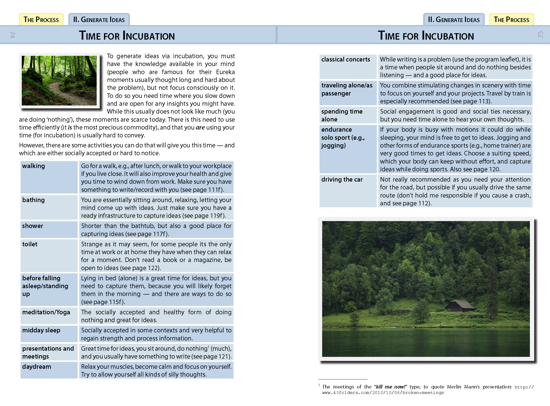To generate ideas via incubation, you must have the knowledge available in your mind (people who are famous for their Eureka moments usually thought long and hard about the problem), but not focus consciously on it. To do so you need time where you slow down and are open for any insights you might have. While this usually does not look like much (you are doing ‘nothing’), these moments are scarce today. There is this need to use time efficiently (it is the most precious commodity), and that you are using your time (for incubation) is usually hard to convey.
However, there are some activities you can do that will give you this time — and which are either socially accepted or hard to notice.
“Organizing Creativity”, page 74
I just read an interesting posting by Pat Thomson on making time to not think. Her blog is well worth reading, esp. if you are an Academic, i.e., (have to) write a lot. She writes about the tension between setting goals to write and the general business of our lives vs. the time needed to get ideas and the need to slow down. It reminds me a bit of what I wrote about “Time for Incubation”:

I also commented this on her posting — you actually have the time for ideas, e.g., walking, bathing, shower, toilet, before falling asleep/getting up, meditation/Yoga, midday sleep, in presentations and meeting, daydreams, classical concerts, traveling along/as passenger, spending time alone, endurance solo sport (e.g., jogging), or while driving the car. You can actually do these activities that give you an ‘excuse’ to think about nothing.
However, you need to be careful not to bring the whole bunch of media distraction with you that is available today. It’s easy, e.g., to listen to podcasts during a walk to the office or while cleaning the apartment (I’m currently working my way through Savage Love, which is interesting and entertaining), but it will prevent you from using this time for incubation because you are not thinking nothing. Some people actually listen to audio books to fall asleep, there is another incubation moment lost. You can go jogging with music which can motivate you, but some people are now also listen to audio books/podcasts while jogging or play immersive running games like “Zombies, Run!” (and you should, if this gets you over the hurdle to run regularly), but which might also prevent you from having ideas when running.
On the other hand, using media can help you to capture more ideas during these times and have them available later. For example, using the notes app on your iPhone allows you to unobtrusively jot down notes about the things you want to use in your next study without making it an awkward “Why is this person taking out a notepad and writing stuff down — is it about me?!!?!” moment for others (they will likely only think that you wrote an SMS or checked an email — aren’t mobile media great?).
So yes, you can have time to think — you need the knowledge to work with in the first place, but then you have to ensure that you have these moments where you are not occupying yourself mentally. You have to defend these times against others (i.e., have an excuse, and “creativity techniques” are useful in this manner, because you are not doing nothing, you are ’employing a technique‘) and — often more difficult — against yourself.
If you don’t do it, you will have a hard time to come up with ideas. For more information look at the chapters about “Generate Ideas” and “Capture Ideas” in the “Organizing Creativity” book.